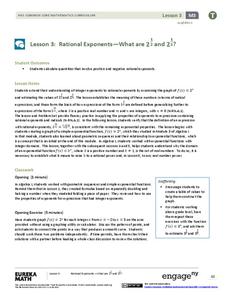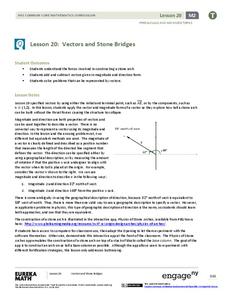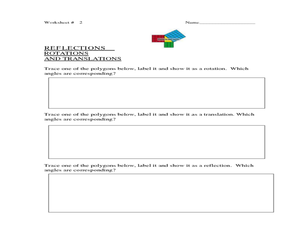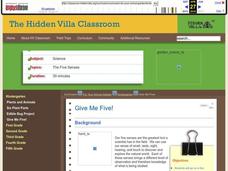Curated OER
Transforming Energy
Super detailed, this lesson will educate physical science learners about the flow of electrons. Begin by reviewing potential and kinetic energy with a moving pendulum, and then get them online to observe interactive websites about...
Illustrative Mathematics
Calculator Trouble
When is not solving the expression the correct answer? When you are checking the understanding of a math concept that is not number dependent. The real question being asked here is to look at the initial number, fraction, mixed number,...
Exploratorium
Holding Charge
Slide paper over a plastic straws to generate static electricity, and then stick that straw to glass, a wall, or even your own hands! This is a science activity that students can use to show parents what they learn in school whenever...
Curated OER
Increasing or Decreasing? Variation 2
Your algebra learners will manipulate an expression's form in order to make obvious the value of it increasing, decreasing, or staying the same, when one variable is changed as the others stay constant. Your future physicists'...
Curated OER
Two Points Determine an Exponential Function I
Learners construct an exponential function from a graph, and two given points on the graph, as they analyze what makes up an exponential function.
Curated OER
Throwing Horseshoes
Collaborative learners interpret a quadratic expression written in different forms in this task centered on throwing horseshoes.
EngageNY
Multiplying and Dividing Expressions with Radicals
That's radical! Simplifying radicals may not be exciting, but it is an important skill. A math lesson provides explanations of properties used throughout the material. Scholars practice skills needed to multiply and divide radical...
Exploratorium
Motor Effect
The magnetic wire. Class members create a magnetic field by running electricity through a wire. The video included in the resource provides information on how this effect is used to make electrical motors.
EngageNY
The Height and Co-Height Functions of a Ferris Wheel
Show learners the power of mathematics as they model real-life designs. Pupils graph a periodic function by comparing the degree of rotation to the height of a ferris wheel.
EngageNY
The Motion of the Moon, Sun, and Stars—Motivating Mathematics
What does math have to do with the behavior of the earth and sun? Learn how the movement of celestial bodies has influenced the development of trigonometry. Scholars connects the details in mathematics to their real-world meaning.
EngageNY
Ferris Wheels—Using Trigonometric Functions to Model Cyclical Behavior
Have class members going in circles as they model the path of a Ferris Wheel using trigonometric functions. Building on the previous lesson in this series on transformations, learners use trigonometric functions to model wheels of...
EngageNY
Rational Exponents—What are 2^1/2 and 2^1/3?
Are you rooting for your high schoolers to learn about rational exponents? In the third installment of a 35-part module, pupils first learn the meaning of 2^(1/n) by estimating values on the graph of y = 2^x and by using algebraic...
EngageNY
Geometric Sequences and Exponential Growth and Decay
Connect geometric sequences to exponential functions. The 26th installment of a 35-part module has scholars model situations using geometric sequences. Writing recursive and explicit formulas allow scholars to solve problems in context.
EngageNY
Vectors and Stone Bridges
What does it take to build a stable arch? Pupils apply vectors and physics as they examine arched bridges and their structural integrity. They use vectors to represent the forces acting on the stone sections and make conclusions based on...
EngageNY
Informally Fitting a Line
Discover how trend lines can be useful in understanding relationships between variables with a lesson that covers how to informally fit a trend line to model a relationship given in a scatter plot. Scholars use the trend line to make...
EngageNY
Negative Exponents and the Laws of Exponents
Apply the properties of exponents to expressions with negative exponents. The fifth lesson in the series explains the meaning of negative exponents through an exploration of the properties taught in the previous lessons of the series....
EngageNY
Rational Numbers on the Number Line
Individuals learn how to plot rational numbers on the number line in the sixth lesson of a 21-part module. They identify appropriate units and determine opposites of rational numbers.
Curated OER
Exaggerated Poetry
Students use physical poses and vocal choices to create emphasis in communication. In this exaggerated Poetry lesson, students use physical movement and vocal choices to exaggerate an expression make a connection between literary content...
Curated OER
Point Comparisons
Young geometers investigate two-dimensional figures using coordinate grids. They identify polygons and draw examples of their reflection, rotation, and translation on a coordinate grid. And they complete a worksheet practicing examples...
Curated OER
Give Me Five!
Students become familiar with their five senses and how their experiences would change without them. In this observations instructional activity, students observe using their five senses in a garden. Students illustrate what they've...
Curated OER
Subject-Verb Agreement Context Exercises
Focus on verb agreement with this clear, concise worksheet. Various subject-verb combinations and sentence examples prompt learners to choose the correct verb to fill in the blank. A great tool and handy guide for this area of grammar.
Curated OER
Energy Plus!
"Energy Plus!" from Together Counts is three days worth of lessons, discussions, and activities about nutrition. The materials help you teach youngsters about eating healthy and burning calories. Energy in and energy out. Included are...
Curated OER
How does the solution change?
Four simple equations, each with two variables, try to get at the important question of reasoning about equations. The problem isn't to solve the equations, but to understand the nature of their solutions. These equations address the...
Curated OER
Birds' Eggs
More than just data, scatter plots are full of information that can be used to answer a variety of questions. This lesson uses a plot with information about bird egg sizes to answer questions about the relationship between length and...
Other popular searches
- List of Positive Attributes
- Positive Attributes Friend
- Free Positive Attributes
- Show Positive Attributes

























